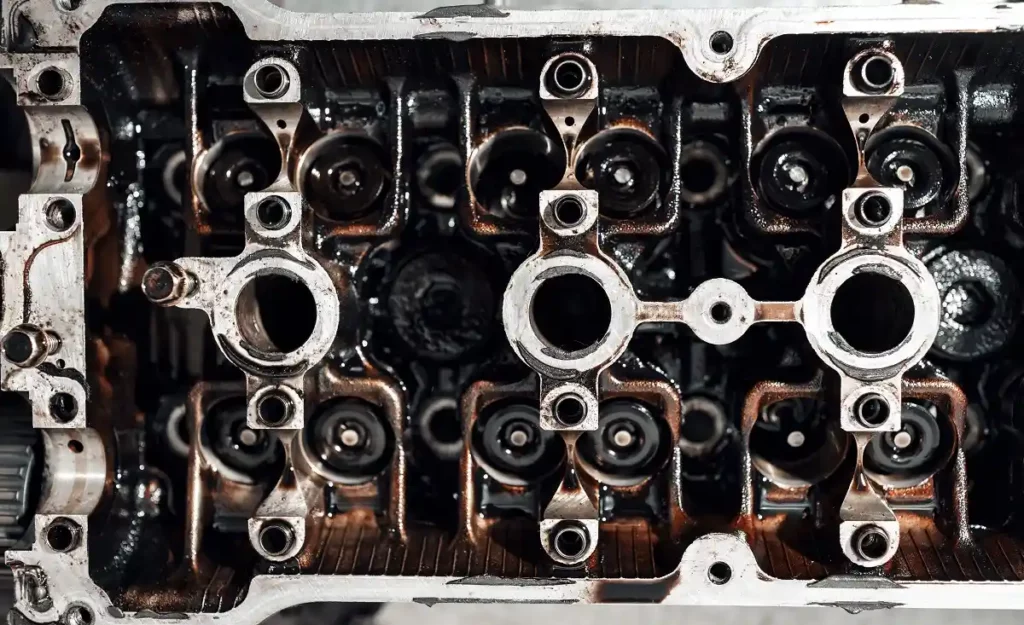Your vehicle’s engine is a marvel of precision engineering, and one of the most crucial elements that keeps it running smoothly is the engine oil. Think of engine oil as the lifeblood of your car’s motor – it’s responsible for ensuring all the moving parts work harmoniously and efficiently. But what happens when you neglect the regular oil change schedule? In this blog post, we’re diving into the world of engine maintenance to explore the repercussions of not changing your oil on time.
From the moment you turn the key, engine oil gets to work, providing vital functions like lubrication, cooling, and cleaning. Over time, however, heat, contaminants, and the breakdown of additives takes their toll on this essential fluid. That’s why adhering to your manufacturer’s recommended oil change intervals is more than just a suggestion – it’s a safeguard against a cascade of potential issues that could otherwise wreak havoc on your vehicle’s performance and longevity.

The Role of Engine Oil
Engine oil is more than just a lubricant; it’s a multitasking marvel that keeps your engine humming along smoothly. As the heart of your vehicle, the engine contains numerous moving parts that work together with precision. Here’s a closer look at the vital roles engine oil plays:
- Lubrication — Within the engine, countless metal components move against each other at high speeds. Without proper lubrication, these parts would generate excessive friction and wear, leading to premature failure. Engine oil forms a protective layer between these parts, reducing friction and extending their lifespan. Advanced fully-synthetic engine oils such as the Motul 8100 series of oils improve on lubrication by naturally wanting to stick to metal.
- Cooling — Your engine generates an immense amount of heat as it converts fuel into power. Engine oil helps dissipate this heat, preventing overheating and ensuring the engine operates within safe temperature ranges.
- Cleaning — As engine components move and interact, tiny metal shavings, dirt, and debris can accumulate. Engine oil acts as a cleaning agent, carrying away these particles and preventing them from causing blockages or damaging parts.
- Sealing — Engine oil creates a barrier between various engine components, preventing leaks and maintaining proper compression within the cylinders. This seal prevents the escape of gases and ensures efficient combustion.
In essence, engine oil keeps the engine running smoothly by reducing friction, dissipating heat, cleaning internal components, and maintaining proper sealing. However, as oil ages, it loses its effectiveness in performing these crucial functions, making timely oil changes all the more essential.
The Importance of Regular Oil Changes
Just like any other fluid in your vehicle, engine oil has a limited lifespan. Over time, it undergoes chemical changes due to exposure to high temperatures, contaminants, and the mechanical stress of the engine’s operation. These changes can lead to a decrease in oil’s ability to perform its vital functions effectively. This is where regular oil changes come into play.
Following your vehicle manufacturer’s recommended oil change intervals is not a mere suggestion – it’s a key component of proper engine maintenance. Here’s why staying on top of these intervals is so crucial:
- Optimal Performance — Fresh, clean oil ensures that all the engine’s moving parts can function smoothly without excessive friction. This leads to better overall performance, smoother acceleration, and improved fuel efficiency.
- Engine Longevity — The wear and tear that occurs due to insufficient lubrication can significantly reduce your engine’s lifespan. Regular oil changes provide the protection needed to prevent unnecessary wear and extend the life of your engine.
- Prevention of Damage — As oil ages, it can lose its viscosity and become less effective at cleaning and cooling. This can lead to the buildup of sludge and deposits that clog important engine components. By changing the oil at recommended intervals, you prevent these deposits from forming and causing damage.
- Optimized Fuel Efficiency — Clean engine oil reduces friction, which in turn helps your engine operate more efficiently. When your engine doesn’t have to work as hard to overcome friction, it uses less fuel, ultimately saving you money at the pump.
- Warranty Compliance — For those with newer vehicles under warranty, adhering to recommended maintenance schedules, including oil changes, is often a requirement to keep your warranty valid.
In a world where engines are finely tuned pieces of engineering, neglecting regular oil changes can lead to a domino effect of problems that compromise performance, efficiency, and even safety. It’s a small investment in time and money that pays off significantly in the long run.
Consequences of Overdue Oil Change
Imagine your engine as a symphony of perfectly synchronized movements. Each component plays its role in harmony, and engine oil is the conductor that keeps everything in tune. However, when you neglect timely oil changes, that harmonious symphony can quickly turn into a discordant cacophony of problems. Here are some of the potential consequences of delaying or skipping oil changes:
- Increased Friction and Wear — As engine oil breaks down over time, it loses its ability to provide effective lubrication. This leads to increased friction between moving parts, causing accelerated wear and tear. The result? Premature engine failure and the need for costly repairs.
- Sludge Formation — Over time, oil can become contaminated with dirt, debris, and byproducts of combustion. If not changed regularly, these contaminants can form a thick, gooey substance known as engine sludge. Sludge can clog vital oil passages, preventing proper lubrication and cooling.
- Reduced Engine Efficiency — Dirty and deteriorated oil cannot effectively cool the engine or clean its components. This can lead to decreased engine efficiency, decreased power output, and increased fuel consumption.
- Overheating — One of the primary roles of engine oil is to dissipate heat. When the oil becomes less efficient at heat transfer, the engine can overheat, potentially causing severe damage to various components.
- Increased Emissions — Inefficient combustion due to poor lubrication and dirty oil can lead to higher emissions of pollutants. This not only harms the environment but can also lead to failed emissions tests.
- Engine Knocking and Noises — Insufficient lubrication can lead to a phenomenon called “engine knocking,” which produces loud and unsettling noises. These noises are a clear indication that your engine is suffering due to lack of proper lubrication.
- Expensive Repairs — Ignoring regular oil changes can lead to significant engine damage, requiring extensive repairs or even engine replacement. The costs associated with such repairs can far exceed the relatively low expense of routine oil changes.
It’s essential to understand that the consequences of delayed oil changes are not a matter of “if,” but “when.” Even if you’re lucky enough not to experience immediate issues, the long-term effects can be disastrous.
Recognizing Signs of Neglected Oil Changes
Your vehicle is more than just a mode of transportation – it’s a finely tuned piece of machinery that communicates with you through various signs and signals. When it comes to neglected oil changes, your vehicle won’t stay silent. It will send you warning signs that it’s time to address the issue. Here are some common indicators that your engine might be suffering from the effects of not changing your oil on time:
- Engine Noises — Unusual knocking, tapping, or ticking sounds coming from the engine could signal that there’s insufficient lubrication. These noises are often a clear sign that components are rubbing against each other without the protective layer of oil.
- Oil Warning Light — Modern vehicles are equipped with warning lights on the dashboard, including the infamous oil pressure light. If this light illuminates, it’s a signal that your engine might not be receiving adequate lubrication.
- Dark and Dirty Oil — Checking the oil level and its appearance using the dipstick can provide valuable insights. If the oil is dark, gritty, or contains debris, it’s an indication that it’s overdue for a change.
- Decreased Performance — Sluggish acceleration, reduced power, and poor fuel efficiency can all stem from neglected oil changes. Clean and fresh oil is essential for optimal engine performance.
- Overheating — If your engine temperature gauge starts climbing into the red zone, it could be due to inadequate lubrication and heat dissipation caused by deteriorated oil.
- Exhaust Smoke — Excessive smoke from the exhaust, particularly if it’s bluish in color, could be a result of oil burning in the combustion process. This often indicates oil leaks or other internal issues.
- Unusual Smells — If you detect a burnt oil smell when your vehicle is running, it could be a sign of oil leaking onto hot engine components due to degraded seals or gaskets.
Recognizing these signs and addressing them promptly can help prevent further damage and costly repairs. However, the best approach is to proactively maintain your engine through regular oil changes.
Repairing the Damage

Neglecting regular oil changes can lead to a cascade of problems that affect your engine’s performance and longevity. If you find yourself in a situation where your engine has suffered due to delayed oil changes, the necessary repairs can vary depending on the extent of the damage. Here’s a look at potential repair processes that might be required:
- Routine Maintenance — In less severe cases, where the damage is caught early, a routine maintenance procedure might suffice. This could involve draining the old, degraded oil, replacing the oil filter, and thoroughly cleaning the engine to remove accumulated sludge and deposits.
- Engine Flush — If sludge buildup is significant, an engine flush might be necessary. This involves using a specialized cleaning solution to flush out the engine and remove stubborn deposits. However, engine flushing should be performed cautiously to avoid dislodging debris that could cause blockages.
- Component Inspection and Replacement — In cases of more substantial damage, certain engine components might need to be inspected for wear and potential replacement. This could include parts like piston rings, bearings, and gaskets that might have been affected by increased friction and heat.
- Engine Overhaul or Replacement — In severe cases, neglecting oil changes can lead to irreversible damage to critical engine components. This might necessitate an extensive engine overhaul or, in extreme situations, even the replacement of the entire engine.
- Seal and Gasket Replacement — Oil leaks can occur as seals and gaskets become brittle and fail due to prolonged exposure to heat and degraded oil. Replacing these seals and gaskets might be necessary to prevent further oil leaks and ensure proper engine function.
It’s worth noting that the cost of repairs can vary widely based on the type of vehicle, the extent of the damage, and the specific repairs needed. Prevention through regular oil changes is undeniably more cost-effective and less stressful than dealing with the aftermath of neglect. If you suspect that your engine might be suffering due to missed oil changes, it’s recommended to consult a professional mechanic for a thorough assessment and appropriate recommendations.
Preventive Measures
The old saying “an ounce of prevention is worth a pound of cure” couldn’t be more accurate when it comes to engine maintenance. Avoiding the pitfalls of neglected oil changes is entirely within your control by taking some simple yet effective preventive measures. Here’s how you can ensure your engine remains in top-notch condition:
- Follow Manufacturer Recommendations — The most important step is to adhere to your vehicle manufacturer’s recommended oil change intervals. These guidelines are based on extensive testing and are tailored to your specific vehicle’s needs.
- Set Reminders — In our busy lives, it’s easy to forget routine maintenance tasks. Set reminders on your phone or use the vehicle’s onboard maintenance reminder system to stay on track.
- Regularly Check Oil Levels — Periodically check your oil level using the dipstick. If you notice a significant drop in oil level between changes, it could be a sign of a leak or excessive consumption, both of which should be addressed promptly.
- Monitor Oil Quality — Along with checking the level, assess the oil’s color and consistency. Fresh oil is usually amber or light brown, while old oil is dark and sludgy. If it looks dirty, it’s time for a change.
- Consider Your Driving Habits — If you frequently engage in stop-and-go driving or towing heavy loads, you might need more frequent oil changes. Consult your owner’s manual or a mechanic for guidance tailored to your driving habits.
- Use Quality Oil and Filters — When getting an oil change, opt for high-quality synthetic oil and filters. While it might seem cost-effective to skimp on these components, investing in quality products can contribute to your engine’s longevity.
- Consult a Professional — If you’re unsure about your vehicle’s maintenance needs or suspect any issues, consult a professional mechanic. They can provide expert advice and catch potential problems before they escalate.
By taking these preventive measures, you can ensure that your engine remains well-lubricated, properly cooled, and free from damaging sludge and debris. Regular oil changes are a small investment that yields significant returns in terms of engine performance, efficiency, and lifespan.
Use Motul and Keep Your Engine Healthy
Your vehicle’s engine is a complex and finely tuned piece of machinery that relies on proper maintenance to perform at its best. Neglecting something as seemingly simple as regular oil changes can have far-reaching consequences that affect performance, efficiency, and even the life of your engine.
From the crucial roles of engine oil in lubrication, cooling, cleaning, and sealing, to the potential consequences of delaying oil changes, it’s evident that this maintenance task is not to be taken lightly. The importance of adhering to manufacturer recommendations cannot be overstated – it’s the foundation of a healthy and long-lasting engine. With Motul, you can focus on maintenance intervals and trust us to provide you with perfect lubrication. Check out our catalog and find the perfect Motul motor oil for your engine!





